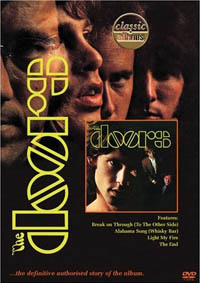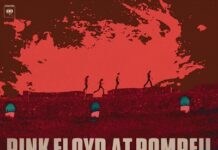The making of the Doors’ first album lends itself to the classic rock
and roller coaster tale of success interlaced with danger. Running parallel
to the band’s origins and rise to prominence, the story behind the album
gets a proper telling via the consistently thorough and definitive Classic
Albums Series. Founding members Robby Krieger, Ray Manzarek and John Densmore,
along with über fans Henry Rollins and Perry Farrell, and a host of others,
all weigh in. The general sentiment is unanimous: The Doors
is one of the most magnificent and unique debuts ever recorded.
The appearance of the Doors in the 1960s was a big black stain on the psychedelic
freak flag. It wasn’t because Jim Morrison had little affinity with the
flower power movement; he did in some many ways. Yet, he was seemingly predisposed
to dancing around darker, less loftier themes through his own experiences infused
with heavy literary doses of Rimbaud, Nietzsche and the Beats. As Krieger says
at one point, “The Doors were about reality.”
Manzarek is particularly animated in his colorful recollections of forming
the band with Morrison. The occasion has been told innumerable times in books
and films — how the two former UCLA students made a pact to “break
on through” and push the boundaries of rock and roll. They recruit Krieger
and Densmore, record a few demos, get turned down by Columbia Records, and head
to the Sunset Strip to cultivate their songs and live act. On the recommendation
of Love’s Arthur Lee, Elektra Records’ chief Jac Holzman catches
the Doors’ act and signs them on the spot. Paired with legendary producer
Paul Rothchild and engineer Bruce Botnik, the Doors and their self-titled debut
commences to put the recording industry on its ear.
Like other Classic Albums programs, the most fascinating portion focuses
on the building bricks, i.e., the songs and how they were recorded. Botnick
tracks through most of the tunes, isolating parts, playing alternate/demo versions,
and commenting on the outcome. Krieger, Manzarek and Densmore recreate key instrumental
breaks as they explain their contributions. You learn how “Light My Fire”
grew from a Krieger riff, and was then transformed with Densmore’s Latin
beat, Manzarek’s eerie intro and Morrison’s bellowing baritone.
Sadly, we are deprived of Rothchild’s perspective because he passed away
in 1995, but other players — manager Bill Siddons, DJ Jim Ladd and Rolling
Stone Editor Ben Fong Torres — fill in the gaps where and when they can.
Certainly without Morrison’s input, viewers may feel there’s something
missing. Thankfully, the most credible insiders stick to the music, praising
Morrison for his contributions instead of his excesses. Only Densmore, who clashed
with the singer more than the others (and is not part of Riders Of The Storm,
Manzarek and Kreiger’s current Doors tribute band), feels the need to
explain that not all geniuses wear leather pants, swig booze and die young.
Then again, that belligerant and drunk genius is a big reason the Doors legacy
is still highly documented. In the end, it took the climate, the cast of characters
and the craziness to make The Doors the classic album it is
for generations to come.
~ Shawn Perry




















